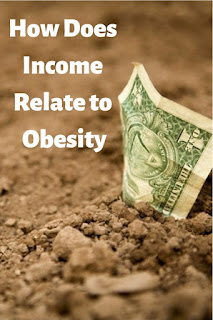Low Income and Obesity
Some of the studies answer this question with the level of education and intelligence, stating the higher level of education, the less likely to be obese.
Yet there are plenty of intelligent people with a college education that are overweight or obese with the accompanying health issues like type II diabetes. But then there are the statistics showing that show a connection with low income and obesity.
A 2006 study by the Colorado Health Foundation titled the “Income, Education and Obesity” found that 25% of Colorado children living in low-income households with an average income of $25,000 or less were obese compared to 8% of the children in households with an income of $75,000 or more.
In Colorado, 25% of low-income adults were obese compared with 16.7% of adults with an income of over $75,000. Among high school dropouts, the obesity rate is 25% and for college graduates, 14%. This is from a state that has the lowest obesity rate in the US with 18.9% of adults classified as obese.
In 2009, 31 states reported obesity rates over 25%. In 1991, not one state reported more than a 20% obesity rate. Since the Great Recession of 2008 started and income levels have dropped, the obesity rates have risen, but there is no proof yet that there is a link between these two facts.
According to the US Agriculture Department, between 1985 and 2003, the cost of fruits and vegetables rose by 120%. While the cost of soft drinks, sweets, sugars, and sweets rose by less than 50%. In other words, there is a widening price gap between healthy foods and unhealthy foods [AJCN].
An Australian study had an interesting answer to this question, “eating binges”. When people are living paycheck to paycheck and aren’t even sure where their next paycheck is coming from, so they go on an eating binge when they get a paycheck.
They don’t know where the next meal might be so they eat like crazy when they have the chance. This could be a built-in survival mechanism in humans.
Unhealthy Cheap Food
The more popular answer is cheap fast food and processed foods cause obesity. I don’t think this has anything to do with education level; educated smart people eat fast food.
Fast food restaurants are advertising their cheaper meals. Burger King has its value menu, with a $1 double cheeseburger. Jack In The Box has its Big Cheeseburger for a buck.
Taco Bell has agreements with sports teams. During summer, if your baseball team had 7 or more runs, you get four tacos for $1 if you buy a drink.
These deals are only good the day after the game between 4 and 6 PM. Not surprisingly, right during the dinner hour. Hit a couple of nearby fast food places and you have dinner.
Cheap easy to prepare processed foods are also lacking in nutrients but not in fat and calories.
Low-Income or All Incomes
At the grocery store, I see people with food stamp cards buying t-bone steaks. That’s good for one meal and no leftovers. Are they eating fast food and processed foods the rest of the month until the next food stamp card arrives, probably.
I don’t have the answer. I know plenty of middle and high-income people who are overweight to obese. I see middle to high-income neighbors who are obese coming home with fast food bags in their hands, morning and night.
Cooking Your Own Meals
Cooking your own meals really is cheaper and healthier.
When you do your own cooking, you can buy more foods in bulk cheaply, control your sodium, calorie and fat content and most importantly, you always have leftovers.
Some people will look at you like you’re insane when you mention leftovers for tomorrow night’s dinner. But leftovers are just as healthy and filling as the night before, and already paid for.
Lower income families can also mean parents are busy working more hours and or more than one job. That leaves less time to prepare and cook healthy foods and meals at home with healthy ingredients.
Too Much Salt and Sodium
Sodium is needed by our bodies to keep us healthy but too much sodium is unhealthy. We should not have more than 2,500 mg of sodium per day.
Recent studies at the University of Helsinki found that too much sodium makes the body thirsty for sweet drinks to counteract the over-consumption of salt.
And fast food and processed food is loaded with sodium but they also sell giant soft drinks as well, to go with that salty fast food.
Conclusion
There are several possible answers. The statistics do show that obesity in low-income households is higher than high-income households. Could it be that there are more low-income households or that the number of low-income households is rising just as fast as the obesity rate?
Do low-income households just buy higher-calorie low nutrition processed foods. There is a misconception that healthy food
is just too expensive. There are many ads at the large grocery chains for healthy food every week.
A pot of stew or chili can last several nights with all kinds of vegetables, beans and just one pound of meat. Yet the obesity rate continues to rise at alarming rates.
If the statistics are correct, and being low-income does cause more obesity,
it has to be the type of food low-income families are eating. Fast food and processed foods are not staples.
About the Author
Sam Montana is a certified Food Over Medicine instructor from the Wellness Forum Health Center and certified in optimal nutrition from the Harvard T.H. Chan School of Public Health.
© 2009-2018 Sam Montana

